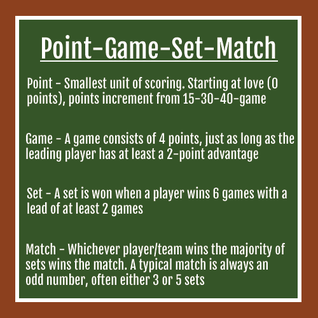
Learn the Rules
Ever seen tennis played? Imagine a tennis court. Now, take away the net, the boundary lines, and the rackets. What’s left?
Tennis and fiction are governed by rules and conventions. How can a tennis player compete with no racket, net, or boundary lines? How can a writer share her vision without at least a rudimentary understanding of point of view, story, sentence structure, or the conventions of genre? Maybe you fancy yourself a rebel, determined to break rules and challenge form. Great, but you first must know the rules to break them.
In high school, I coached a youth basketball team of 9 and 10-year-old girls. I remember walking into the high school multipurpose room—imagine two temporary baskets propped on either end, little girls in gym short ping-ponging here and there, and the smell—you know the smell—rotting bananas, corn dogs, lemon-scented cleaning fluid.
“Ok!” I shouted, blowing my whistle. “Everyone on the baseline!"
One little girl scrambled into place, the rest looked sideways up at me. What on earth was a baseline?My detailed schedule of drills, useless. They needed rules, the most basic rules, before they could play. So we made a game out of learning and raced from baseline to half court, to sideline in a squealing frenzy.
Granted, this isn’t a perfect analogy for writers. Even if you have never written anything but a grocery list and never studied the conventions of the craft, you already know more than you think because you have grown up with stories, and because you read widely and ceaselessly. Right? You’re already aware of how stories affect you. How exciting to learn to create that effect!
How to play.
Silly Video: How to play tennis without a racket ... or a ball.
Community and Solitude
Be active within a community, literary or otherwise, but don’t mistake living in literary circles with literary work. Literary work, "needs solitude. It needs concentration without interruption,” says poet Mary Oliver in her essay “Of Power and Time.” “It needs the whole sky to fly in and no eye watching until it comes to that certainty which it aspires to, but does not necessarily have at once. Privacy…a place apart.”
This place apart is not just a physical space, but also a space inside of you, a sacred space of “otherworldly awareness” from which creativity rises.
Finding this double solitude in which to work—the space within and the space without—has always been difficult...
Read the rest on the Sierra Writers Conference Blog:
(Tired of 2016? Why not get a jump on 2017 by registering for the 2017 Sierra Writers' Conference and by following this blog series, curated by Joyce Wycoff. The series features writing advice from Catharine Bramkamp, Bob Jenkins, Kim Culbertson, and myself.)
 RSS Feed
RSS Feed
